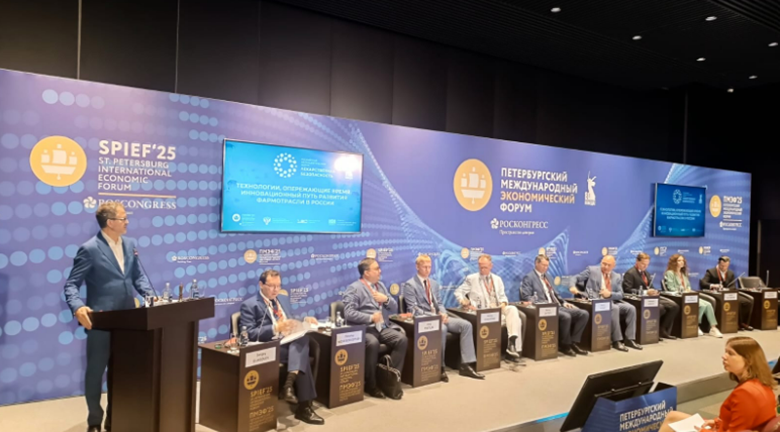Domestic pharmaceutical industry “get stuck” on generics
On June 18, 2025, the “Drug Safety” forum hosted a strategic session titled “Technologies Ahead of Time: An Innovative Path for Russia’s Pharmaceutical Industry,” featuring Deputy Minister of Industry and Trade Ekaterina Priezzheva, Deputy Minister of Health Sergey Glagolev, Deputy Head of the Federal Antimonopoly Service Timofey Nizhegorodtsev, and leaders of major Russian pharmaceutical companies. The discussion was moderated by Alexey Kedrin, Chairman of the Board of the EAEU Pharmaceutical Manufacturers Association, and Oleg Lavrov, Advisor to the Director General of the Innovation Engineering Center ANO.
Developing domestic innovative drug production and industry localization under state strategies requires coordinated efforts across the healthcare sector. With support from the Innopraktika Foundation, the Russian Ministry of Industry and Trade, Ministry of Health, and Ministry of Education established a Coordination Council to unify businesses, regulators, and development institutions. The Council will identify key biotargets and technologies to focus resources on, aiming to overcome interdepartmental barriers and the “valley of death” in the innovation cycle to accelerate breakthrough healthcare technologies.

An analysis of the current landscape reveals that Russia’s pharmaceutical industry remains reliant on generic drug production. The active phase of import substitution ended in 2018–2019, exhausting further growth opportunities in this direction.
“While the pharmacy market shows growth in domestic manufacturers’ share due to foreign companies’ exit and reduced marketing expenditures, public procurement reflects a declining share of Russian producers, signaling industry stagnation. Clinical trials also show a sharp drop in innovative developments. Since 2022, Phase 1–3 trials, previously funded by foreign firms, have significantly decreased. Today, the pipeline is dominated by generics and biosimilars,” noted Andrey Ivashchenko, Head of the Innovative Pharmaceutical Committee at the National Champions Association and Chairman of the Board of Directors of ChemRar Group.
Technological sovereignty and leadership remain distant goals. Even mastering active pharmaceutical ingredient (API) production fails to address the core issue—the lack of next-generation drug development. There is a risk of repeating the automotive industry’s scenario, where Chinese manufacturers dominate after Western companies’ departure.
Ivashchenko highlighted global trends:
“The FDA approves around 50 new molecular and biological drugs annually, half being costly orphan drugs and the other half breakthrough therapies. Over the past four years, nearly 100 innovative drugs and technologies unavailable in Russia have emerged globally. Without action to foster domestic innovation, the industry risks being forced to register next-generation Western drugs without local trials, as patients will require treatments for resistant disease forms developing under current standards.”
China’s experience was underscored: its share of global innovations rose from 4% in 2013–2014 to 30% today, with over 4,000 clinical projects, including 2,000 first-in-class drugs and 1,000 next-in-class developments—rivaling U.S. research volumes.
Ivashchenko noted that the U.S. biotechnology sector’s decline and China’s rapid growth present opportunities for Russia:
“This opens avenues to acquire promising developments suspended in U.S. Phase 1–2 trials via partnerships with friendly nations, including Arab states and China, where market restrictions incentivize technology transfers to Russia.”
Such collaborations have already accelerated the inflow of breakthrough drugs and technologies absent in Russia. However, institutional state support is needed to coordinate biotech cooperation within BRICS.
Modeling suggests innovative import substitution would require ~100 billion RUB, with returns in ~8 years. Producing ~100 drugs (half biologics, half small molecules) is feasible given current funding. Domestic demand can drive market growth and incentivize innovation, ensuring economic returns.
Timofey Nizhegorodtsev, Deputy Head of Russia’s Federal Antimonopoly Service, stressed that innovation thrives on competition, urging policies to make drug development profitable while ensuring affordability.
Proposed support measures include pre-review approval of innovative projects to align with priorities, a “pay-for-success” reimbursement system, and conditional registration post-Phase 2 to offset R&D costs.
Sergey Glagolev, Deputy Minister of Health, added: “We’ve reformed registration by introducing conditional approval and defining criteria for socially significant drugs, which should integrate into clinical guidelines and the Essential Drugs List (VED).”
For these mechanisms to benefit patients, breakthrough drugs must be included in frequently updated clinical guidelines, with transparent, clinically driven decision-making.
A session recording is available on the SPIEF ’25 website: https://forumspb.com/programme/drug-security-forum/137102/